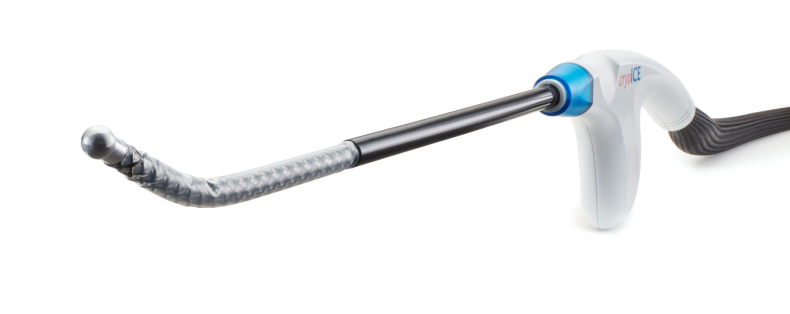Thoracic surgery is deemed to be one of the most painful surgeries to recover from. With postoperative pain often persisting for months, patients’ ability to mobilise and breathe properly is compromised, often leading to complications such as chest infections. Long-term effective pain relief is necessary to promote quick recovery and healing, which cryotherapy delivers in the form of a specialised probe.
Postoperative pain after thoracic surgery
Mr Silviu Buderi, consultant thoracic surgeon at Royal Brompton Hospital, specialises in thoracic surgery and is an expert in the surgical management of lung cancer. He explains “despite significant advancements in surgical techniques, patients often encounter difficulties with the management of postoperative pain.”
However, in recent years, cryotherapy, a type of cold therapy, has emerged as a promising and innovative approach to alleviate postoperative pain in thoracic surgery patients. Royal Brompton Hospital is proud to be the first UK provider to offer 6 months of pain relief for these patients by utilising cryotherapy during thoracic surgery.
The rationale for cryotherapy in thoracic surgery
Following thoracic surgery, patients often experience pain due to tissue trauma, nerve irritation, and the inflammatory response triggered by surgical intervention. Traditional pain management approaches typically include local anaesthesia, intravenous or oral opioids, and non-steroidal anti-inflammatory drugs (NSAIDs). “However, these medications may have side effects, can be addictive, and may not provide sufficient pain relief for more sensitive patients,” notes Mr Buderi.
Instead, cryotherapy offers an alternative approach that targets pain and inflammation directly for around 6 months after surgery. By applying cold temperatures to the nerves that supply the operated area, cryotherapy can effectively numb the area, reduce nerve activity, and constrict blood vessels, thereby diminishing pain and swelling.
“I would recommend that patients combine cryotherapy with other oral pain medication after surgery for the best pain relief, especially in the first few days after surgery,” says Mr Buderi. “Within one week, they should be able to resume normal activity and some even return to work at this point, if they have sedentary jobs.”
Application of cryotherapy in thoracic surgery
Cryotherapy for thoracic surgery comes in the form of cryoanalgesia which Mr Buderi particularly recommends to high-risk, complex patients, or patients undergoing thoracic surgery involving a large incision. “I would also recommend this therapy to patients with a history of ischemic heart disease because I want their pain to be well-controlled to reduce stress on their hearts and minimise postoperative complications,” explains Mr Buderi.
Cryoanalgesia, first offered in the UK at Royal Brompton Hospital, is a technique which freezes the intercostal nerves responsible for transmitting pain signals, preventing them from reaching the brain. It relies on a specialised cryotherapy device, a cryosphere probe, which administers cold temperatures using nitrous oxide directly to the nerves involved in pain perception. The probe reaches temperatures as low as -70 degrees Celsius and can be applied to five different intercostal spaces with an adjustable tip on the probe.
The treatment works by delivering cold temperatures to the patient’s pain nerves in the chest, temporarily freezing each nerve’s myelin sheath. This process prevents them from transmitting pain signals to the brain until they have healed 6 months to a year later. By this time, the post-surgery pain in the affected area is usually no longer there.
When used during thoracic surgery, cryoanalgesia takes 15 minutes to administer and patients typically begin to feel the effects 12 to 24 hours after the surgery. The manufacturer of the probe, Atricure, states that the effects of the therapy should be felt for six months, but some patients report pain relief even beyond this point.

Specialised cryotherapy probe (cryoICE® cryoSPHERE™ probe (AtriCure, Inc)) uses nitrous oxide to administer cold temperatures directly to the nerves involved in pain perception
What are the benefits of cryotherapy in thoracic surgery?
Cryotherapy has a number of benefits for thoracic surgery patients, beginning with the very obvious point of enhanced pain relief. Cryotherapy provides localised pain relief, minimising the need for systemic medications like opioids, and therefore reducing the risks of potential complications and dependency issues. In fact, a randomised trial of 50 patients showed a reduction in consumption of morphine and restoration of respiratory function after surgery with cryoanalgesia, when compared to surgery without.
Cryotherapy also helps to control inflammation which occurs as a natural response to surgery. However, excessive inflammation is known to lead to tissue damage and prolonged recovery, so working to reduce inflammation helps to mitigate these effects. Reducing blood flow to the surgical site also minimises the risk of potential tissue damage after thoracic surgery.
Further to this, managing pain and inflammation with cryotherapy leads to faster patient recovery and therefore shorter hospital stays following thoracic surgery. At Royal Brompton Hospital, the average hospital stay for patients after thoracic surgery with cryotherapy is just four days, compared to 14 days at some larger hospitals overseas which don’t utilise cryotherapy for thoracic surgery patients.
Cryotherapy is non-pharmacological, carrying a lower risk of complications when compared to opioid medications commonly given postoperatively to patients, which can result in respiratory depression and constipation.
Non-pharmacological pain relief
Cryotherapy presents a promising frontier for pain management in thoracic surgery patients. By targeting pain and inflammation, it directly offers enhanced pain relief, faster recovery, and potentially reduced complications compared to traditional pain management methods.
“As the medical community continues to explore non-pharmacological alternatives to pain management, cryoanalgesia stands out as an effective and safe option to improve patient outcomes in thoracic surgery,” explains Mr Buderi.
Contact our customer services team to learn more about cryotherapy in thoracic surgery at Royal Brompton Hospital, and how patients can benefit from this.
Related content
-
Heart and lung care
Our specialists at Royal Brompton and Harefield hospitals have been advancing heart and lung care for over 100 years – we’re internationally recognised in what we do.
-
New cryotherapy treatment: 6 months of pain relief for chest surgery
-
Thoracic surgery
Our surgeons continuously advance minimally invasive techniques in thoracic surgery, including for lung cancer, COPD and chest deformities.

